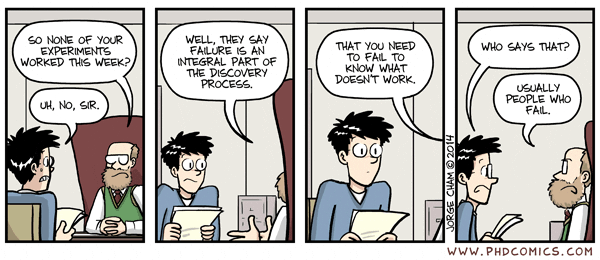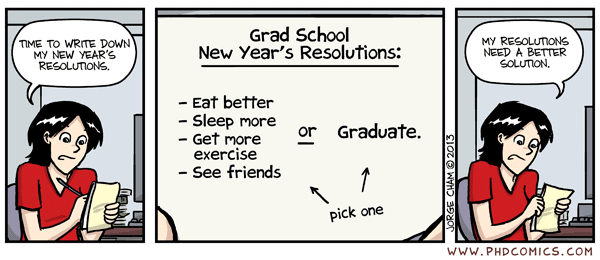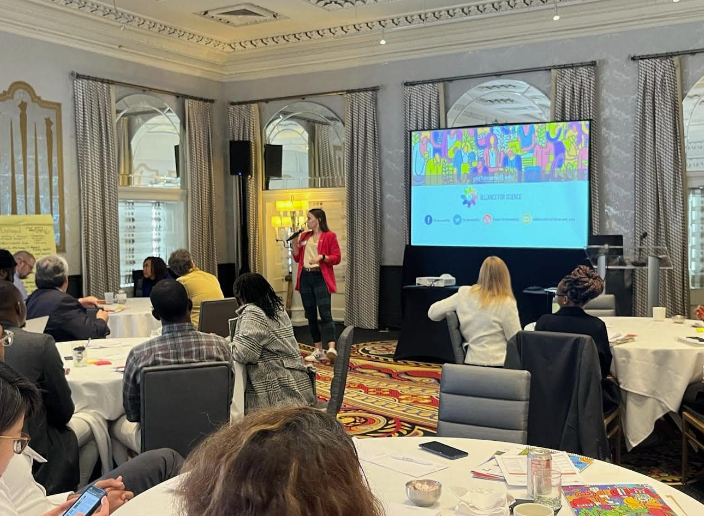Graduate school is hard. Surprise! Eh, probably not a surprise, but in general graduate school is a lot more demanding than college. Pursuing a Ph.D. or M.S. degree in a STEM field often relies on creative and diverse thinking and enormous amounts of independently driven work. It's the independent nature of graduate school that makes navigating towards your terminal degree a unique adventure; you are largely responsible for your own success, and that can be daunting.
But don't worry, as a recent Ph.D. graduate from the University of Georgia (#PHinisheD), I'm here to help. Join me on this two-part graduate school reflection as I countdown the top 11 tips that helped me navigate academia and obtain my Ph.D. First, we focused on honing your professional skills so that you can get the most from your graduate school experience. Check out Part 1 here! Now, in Part 2 we'll turn inward and focus on tips for navigating the internal/affective aspect of graduate school to help you survive this journey!
Part 2: Surviving graduate school
#7 Advocate for yourself
Self-advocacy (yes, this is different than bragging about yourself) is an important skill to learn, particularly when you're navigating a world dominated by a demographic you do not fit into. Typically, self-advocacy means acting on your own behalf with the same persuasive power we use on behalf of others. This is hard to do, and often times we do not self-advocate because we feel uncomfortable, undeserving, or unmotivated. Well, stop it!
Self-advocacy is not only normal but a must in graduate school. Often times self-advocacy leads to positive recognition for your work and opportunities that would have otherwise passed you by. That being said, here are some tips to make this a bit easier:
- Ask others to advocate on your behalf in situations where it is appropriate, such as nominations for awards or speaking engagements.
- Advocate for a group that includes yourself. Often improvements for the collective will also benefit yourself. In these cases, think of self-advocacy as group-advocacy.
Stop worrying about what other people think. Sometimes you have to put you first.
#8 Don't be afraid to fail, but always learn from your failures
Failure is a part of life. Accept it. Embrace it.
In graduate school you'll fail a lot, but don't worry, everyone does, even if they don't admit it. Failure is often a good thing if you are willing to learn from it, because it'll teach lessons more concretely than any success. The key to embracing failure is to not become discouraged, evaluate why you failed, regroup, and let that fuel your desire to come back and show that stupid failure who's boss.

#9 Go ahead and take that afternoon walk
Juggling academics and, well, anything else is a major challenge. Yet, maintaining your overall well-being can go a long way in helping you function at the top of your game.
We all know that studies have shown that exercise and a healthy diet can improve brain function and energy, so do your future-self a favor and incorporate physical activity into your busy schedule. Take afternoon walks, bike to work, or bite the bullet and buy a gym membership. Many universities have recreation centers you can access for cheaper fees. As for eating well, do some weekly meal planning, and switch out that bag of skittles for some carrots.
#10 Mental Health
Exercising is great, but it's not the only health issue you should be cognizant of in graduate school. In recent years, academic communities have started openly communicating about mental health issues within the graduate student population. Ranging from imposter syndrome to physical manifestations of stress, mental health is not something you or anyone should take lightly.
It's not something I talk about often, but I'm no stranger to group therapy. A carry-over from my undergrad days, imposter syndrome and depression are two issues I've battled, with varying degrees of success, most of my graduate career. Based on my own experiences, here is what I recommend:
- Remember you're not alone. If you're feeling lonely or having a hard time adjusting to graduate school, talk to someone (friends and/or family). If the feelings persist, consider going to the professionals on your campus, almost every major university in the nation has a counseling and psychiatric services group. From my own time talking to a therapist every two weeks, I can say with confidence that it helped me recover from my persisting depression and understand that a lot of students go through what I was going through. Also, if you see other students who may be experiencing depression or anxiety, try reaching out. Some people are shy and internalize their concerns, don't be aggressive about it, just let them know you're there to listen if they want to talk.
- Cultivate a good work/life balance. Having friends and hobbies outside of work is a great way to separate yourself from something that is giving you stress. Another way to maintain a good work/life balance is to limit the obligations you say yes to (i.e., learn to say no). There may be consequences for not attending that lecture series, but there are also consequences for overburdening yourself.
- Cut out the people who make you feel uncomfortable or who give you stress. Obviously this has limitations, you can't for instance easily cut out your advisor(s), but you can limit the interactions you have with toxic people.

#11 Learn to say No
We've all heard that as you get older (busier) you'll have to start saying no to opportunities that come your way. This can be a difficult skill for graduate students to master. It doesn't help that academia is a ‘yes' culture where go-getters are expected to say yes to every opportunity presented. I've seen first- hand how blindly saying yes can lead to overcommitments, stress, and a dip in quality of work. For example, when I started graduate school I kept pushing myself to do more and be involved in all research and outreach projects, as a result, my coursework and research obligations started to fall through the cracks. It wasn't until I re-evaluated my priorities and starting saying no to tangentially helpful opportunities that my work started to pick back up.
On the flip side, you shouldn't say no to everything as well. You'd never advance as a scientist. It's about operating at your optimum commitment level, taking on tasks that will propel you forward, but not so fast that you'll burn out.
When faced with a new opportunity, think critically about your time, and the benefits you gain from the proposed opportunity, keeping in mind that what you deem a benefit will change over the course of your career.
Nowadays, when I'm now faced with new opportunities, I ask myself three questions:
- What are the tangible and intangible benefits? Can this directly help me achieve my career goals?
- How much time do I think this will take until it's done. Is this a singular instance type of opportunity, or something that will require renewed investment over time?
- Is this opportunity something I care about either personally or professionally? An activity that centers around my values and interests will be more enjoyable to me even if it does take a while.
For me, graduate school was a fun and amazingly positive experience despite the personal and professional challenges I faced. Honestly, no graduate school experience is without challenges; but those who are successful grow and learn from those obstacles to emerge stronger and ready for new opportunities.
Hopefully, these pieces of advice will help you navigate your own graduate school journey so that it's a positive experience for you as well. This ends part 2 of this advice piece, if you missed it, be sure to check out Part 1, which centered on getting the most out of graduate school.
 Rishi R. Masalia is a Ph.D. graduate from the University of Georgia. Rishi is a founding member of the Athens Science Café and Athens Science Observer. He is an ambassador and science communicator with the American Society of Plant Biologists. For his commitment to science outreach, Rishi was named the 2018 University of Georgia Pillar of the Community, and a 2018 National K. Patricia Cross Scholar. He is a former University of Arizona Wildcat, Coca-Cola addict, smooth dance machine, science fiction savant, and all around nerd. Rishi can be reached at rishimasalia@gmail.com, or followed on Twitter @RishiMasalia. More from Rishi Masalia.
Rishi R. Masalia is a Ph.D. graduate from the University of Georgia. Rishi is a founding member of the Athens Science Café and Athens Science Observer. He is an ambassador and science communicator with the American Society of Plant Biologists. For his commitment to science outreach, Rishi was named the 2018 University of Georgia Pillar of the Community, and a 2018 National K. Patricia Cross Scholar. He is a former University of Arizona Wildcat, Coca-Cola addict, smooth dance machine, science fiction savant, and all around nerd. Rishi can be reached at rishimasalia@gmail.com, or followed on Twitter @RishiMasalia. More from Rishi Masalia.
About the Author
-
athenssciencecafehttps://athensscienceobserver.com/author/athenssciencecafe/April 17, 2020
-
athenssciencecafehttps://athensscienceobserver.com/author/athenssciencecafe/April 12, 2020
-
athenssciencecafehttps://athensscienceobserver.com/author/athenssciencecafe/April 3, 2020
-
athenssciencecafehttps://athensscienceobserver.com/author/athenssciencecafe/March 30, 2020







